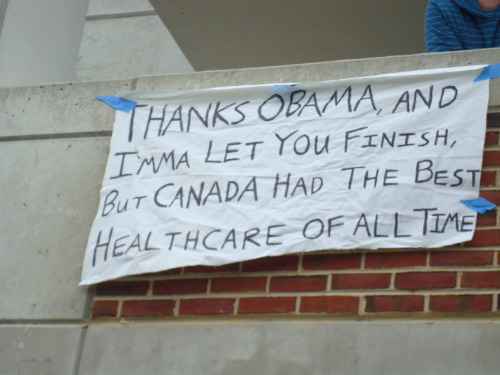What keeps you up at night?
Wednesday, September 30, 2009
Without Bush, media lose interest in war caskets
Remember the controversy over the Pentagon policy of not allowing the press to take pictures of the flag-draped caskets of American war dead as they arrived in the United States? Critics accused President Bush of trying to hide the terrible human cost of the wars in Iraq and Afghanistan."These young men and women are heroes," Vice President Biden said in 2004, when he was senator from Delaware. "The idea that they are essentially snuck back into the country under the cover of night so no one can see that their casket has arrived, I just think is wrong."
In April of this year, the Obama administration lifted the press ban, which had been in place since the Persian Gulf War in 1991. Media outlets rushed to cover the first arrival of a fallen U.S. serviceman, and many photographers came back for the second arrival, and then the third.
But after that, the impassioned advocates of showing the true human cost of war grew tired of the story. Fewer and fewer photographers showed up. "It's really fallen off," says Lt. Joe Winter, spokesman for the Air Force Mortuary Affairs Operations Center at Dover Air Force Base in Delaware, where all war dead are received. "The flurry of interest has subsided."
Saturday, September 26, 2009
Friday, September 25, 2009
Environmentalists Seek to Wipe Out Plush Toilet Paper
There is a battle for America's behinds.It is a fight over toilet paper: the kind that is blanket-fluffy and getting fluffier so fast that manufacturers are running out of synonyms for "soft" (Quilted Northern Ultra Plush is the first big brand to go three-ply and three-adjective).
It's a menace, environmental groups say -- and a dark-comedy example of American excess.
The reason, they say, is that plush U.S. toilet paper is usually made by chopping down and grinding up trees that were decades or even a century old. They want Americans, like Europeans, to wipe with tissue made from recycled paper goods.
It has been slow going. Big toilet-paper makers say that they've taken steps to become more Earth-friendly but that their customers still want the soft stuff, so they're still selling it.
This summer, two of the best-known combatants in this fight signed a surprising truce, with a big tissue maker promising to do better. But the larger battle goes on -- the ultimate test of how green Americans will be when nobody's watching.
Wednesday, September 23, 2009
Tuesday, September 22, 2009
Steven Chu: Americans Are Like ‘Teenage Kids’ When It Comes to Energy
When it comes to greenhouse-gas emissions, Energy Secretary Steven Chu sees Americans as unruly teenagers and the Administration as the parent that will have to teach them a few lessons.Speaking on the sidelines of a smart grid conference in Washington, Dr. Chu said he didn’t think average folks had the know-how or will to to change their behavior enough to reduce greenhouse-gas emissions.
“The American public…just like your teenage kids, aren’t acting in a way that they should act,” Dr. Chu said. “The American public has to really understand in their core how important this issue is.” (In that case, the Energy Department has a few renegade teens of its own.)
The administration aims to teach them—literally. The Environmental Protection Agency is focusing on real children. Partnering with the Parent Teacher Organization, the agency earlier this month launched a cross-country tour of 6,000 schools to teach students about climate change and energy efficiency.
“We’re showing people across the country how energy efficiency can be part of what they do every day,” said EPA Administrator Lisa Jackson. “Confronting climate change, saving money on our utility bills, and reducing our use of heavily-polluting energy can be as easy as making a few small changes.”
Sunday, September 20, 2009
The politicized art behind the ACORN plan
Everything you needed to know about the unorthodox roll out of the now-notorious ACORN sting videos was hidden in plain sight in my Sept. 7 column, Katie Couric, Look in the Mirror. ACORN was not the only target of those videos; so were Katie, Brian, Charlie and every other mainstream media pooh-bah.They were not going to report this blockbuster unless they were forced to. And they were. What's more, it ain't over yet. Not every hint I dropped in that piece about what was to come has played itself out yet.Stay tuned.
When filmmaker and provocateur James O'Keefe came to my office to show me the video of him and his friend, Hannah Giles, going to the Baltimore offices of ACORN - the nation's foremost "community organizers" - dressed as a pimp and a prostitute and asking for - and getting - help for various illegal activities, he sought my advice. In the past, Mr. O'Keefe created brilliant social satire that rocked his college campus and even made its way on to the talk-radio and cable-news shows, but the magnitude of his latest adventure had the potential to rock the political establishment.
I was awed by Mr. O'Keefe's guts and amazed by the footage, but explained that the mainstream media would try to kill this important and illuminating expose about a corrupt and criminal political racket, and that the well-funded political left would go into "war room" mode, with 25-year-old Mr. O'Keefe and 20-year-old cohort Miss Giles in the cross hairs. I felt I had a moral obligation to protect these young muckrakers from the left and from the media, and to devise a strategy that would force the media's hand.
Once the American public saw with its own eyes the grotesque, common practices of ACORN's housing offices, Mr. O'Keefe and Miss Giles could no longer be a legitimate focus of media scrutiny. Kill the messenger doesn't work with the American people when they realize that the message is so devastating and honest. I think the video exposed the misuse of public funds and systemic manipulation of the tax code in the name of "helping the poor."
Saturday, September 19, 2009
Friday, September 18, 2009
Thursday, September 17, 2009
Jeremy Clarkson targeted in manure dump protest by climate campaigners
The simmering war that has long been waged between environmentalists and Top Gear presenter Jeremy Clarkson escalated today when seven women from the pressure group Climate Rush arrived at his £2m Cotswolds house and dumped six bags of horse manure on his drive and front lawn."Clarkson was not there but we left several steaming piles of manure and a message saying 'this is what you're landing us in'," said Tamsin Omond, one of the activists from Climate Rush. "We targeted Clarkson because of his blasé attitude towards climate change, as illustrated byhis recent drive to the Arctic," she added .
The seven campaigners, dressed as suffragettes, arrived at the automatically opening wrought iron gates of Clarkson's Cotswold mansion outside Chipping Norton, Oxfordshire, in a van fuelled by chip-fat oil. No one answered the door, but the police were called.
The Top Gear presenter, a self confessed libertarian, has made a name by promoting speed and antagonising environmentalists. "What's wrong with global warming? We might lose Holland but there are other places to go on holiday," he wrote once in the Sun. On Top Gear, he has also lauded naturalist David Bellamy, who has disputed that man-made warming exists.
Friday, September 11, 2009
Friday September 11, 2009: From Congressman John Campbell
Many of you probably watched the President's Wednesday night address to a joint session of Congress on health care. Such addresses to a joint session are usually done for the State of the Union or a national military emergency (9/11). It is quite rare to use this for a single policy address.
I was frankly surprised at what went on. This was really more like a lecture than a speech. Rather than accept the legitimate concerns of those (including this writer) who disagree with the president's health care plan and discuss potential for compromise, Mr. Obama chided and taunted his opposition. You can't say "we will call you out" in reference to people who will say things with which the President disagrees, and then expect to work with and be trusted by those same people. The President's tone was haughty and condescending. As a result, the atmosphere is the room was extremely acrimonious. Maybe this mood didn't come across on TV, but you could cut the air with a knife in that room. That is why there were more outbursts than usual.
The President sets the tone, and the tone was one of confrontation and about as far from bipartisanship as could be. His message was basically this: ‘Here is my health care plan and if you oppose it, then you are against reform at all.’ As one Republican Senator remarked, he said ‘it's my way or the highway.’
Thursday, September 10, 2009
Saturday, September 5, 2009
Obama, the Mortal
But forget the character witnesses. Just look at Obama's behavior as president, beginning with his first address to Congress. Unbidden, unforced and unpushed by the congressional leadership, Obama gave his most deeply felt vision of America, delivering the boldest social democratic manifesto ever issued by a U.S. president. In American politics, you can't get more left than that speech and still be on the playing field.In a center-right country, that was problem enough. Obama then compounded it by vastly misreading his mandate. He assumed it was personal. This, after winning by a mere seven points in a year of true economic catastrophe, of an extraordinarily unpopular Republican incumbent, and of a politically weak and unsteady opponent. Nonetheless, Obama imagined that, as Fouad Ajami so brilliantly observed, he had won the kind of banana-republic plebiscite that grants caudillo-like authority to remake everything in one's own image.
Accordingly, Obama unveiled his plans for a grand makeover of the American system, animating that vision by enacting measure after measure that greatly enlarged state power, government spending and national debt. Not surprisingly, these measures engendered powerful popular skepticism that burst into tea-party town-hall resistance.
Obama's reaction to that resistance made things worse. Obama fancies himself tribune of the people, spokesman for the grass roots, harbinger of a new kind of politics from below that would upset the established lobbyist special-interest order of Washington. Yet faced with protests from a real grass-roots movement, his party and his supporters called it a mob -- misinformed, misled, irrational, angry, unhinged, bordering on racist. All this while the administration was cutting backroom deals with every manner of special interest -- from drug companies to auto unions to doctors -- in which favors worth billions were quietly and opaquely exchanged.


